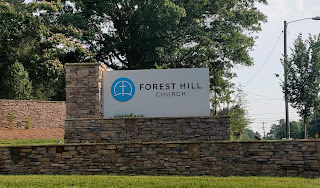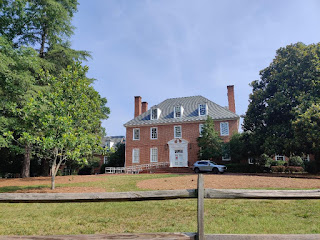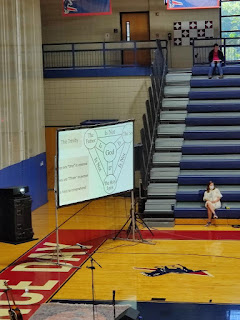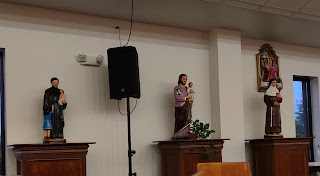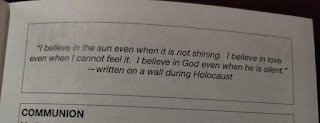This morning, I attended Moments of Hope Church here in Charlotte. This place is the new church that David Chadwick has started up (more about him in a bit). This service was held around the basketball court of Providence Day School. When not at Providence Day, the church meets at at the Moments of Hope Farm about fifty minutes outside of Charlotte, right over the border of South Carolina as you head west. They meet at the farm about once a month.
Here are some pictures of worship at the Moments of Hope Church Farm (it looks pretty fun!):
I attended the Providence Day School location with MC. The rest of the family has (we think) seasonal allergies... but since there were many stuffed up noses and a few coughs, we thought it made sense for everyone else to stay home. And I don't like going to church when the whole family isn't going, so we didn't make Freedom House this morning. :(
A bit about the backstory of Moments of Hope Church (henceforth MoHC).
David Chadwick is the Pastor of MoHC. For many years, David enjoys the status of "Christian famous" here in Charlotte. He took over the property of a ministry that experienced a particularly public decline in the late 1980s and turned it into Forest Hill Church. Forest Hill is an expansive and impressive campus.
David Chadwick played basketball at Chapel Hill in the 1970s for Dean Smith and he was good enough to play pro for a small while, and he is also a solid family man. He felt a calling by the Lord to go into ministry and followed that calling to the helm of Forest Hill. That church flourished for decades, but he left the head pastor role at Forest Hill a few years back. In short, he has and had all of the ingredients that make for a successful pastor in this many-churched city.
I've visited Forest Hill a few times over the years, including as part of my friends Bill and Bethany's daughter's christening ceremony (Forest Hill does not do infant baptisms). Chadwick is great fun to listen to and is clearly the kind of leader who builds a solid following. He also had a little morning snippet on the local AM radio station WBT. I used to hear it often.
Why he left Forest Hill is not clear to me, nor does it matter much. From what I have heard, he found out that some of the church's staff was not tithing and brought that concern to them. There was some fallout from that and he was eventually voted out of his position by the church's board.
I don't know the veracity of this narrative. But this was an important backstory to touch on before proceeding.
If you go back to my eighth church on this journey, it was to Forest Hill (post #92).That was July of last year.
That is some info on the background of David Chadwick, enough on it.
Of note, I didn't see Chadwick preach this morning.
***
With MC in tow, I drove from our home to Providence Day School. It was about five minutes away. When we got there, we met the women who were overseeing the child care, where we learned they only provide child care for children up to three. As a result, MC was with me the whole service. She was coloring during service.The turnout was solid. In a place that seat a couple thousand when packed, this service had about three hundred worshipers.
The service started up when the kids were called to the court floor to dance as the music started to play. It was really nice. The larger crowd was somewhat staid during the music. About three of us had our hands in the air as we sang, most of the people were swaying almost imperceptibly to the music, which was really good. The songs were from a solo singer on an acoustic guitar.
The service easily transitioned into a children's sermon, which was about obeying God. MC felt uncharacteristically shy, so we stayed up in the stands and watched.
Then there were some announcements...
After that, the sermon finally started up. Discipleship Pastor John Kasay gave the sermon.
It spoke directly into some themes that are happening in my life and my understanding of the Bible. Candidly, it was exactly what I have been thinking and learning about.
The title of the sermon was "Is Your Popcorn Ready?" That title tied back to some story about a football game between Ole Miss and Alabama. I didn't understand how the game was relevant to the sermon, nor do I understand how the title linked to the themes that he expounded on during the sermon.
Despite those small points of confusion, the content of the sermon was excellent. It was about some very basic material, but all of it was really important stuff. That the sermon felt pretty foundational (basic) to me may indicate that I may be undergoing some growth in my knowledge, but I will take this kind of basic eight days a week. And the nature of the message likely met the crowd with exactly the kind of message that many of them needed to hear.
Pastor John started with an explanation of the Trinity, using a common picture that I have seen many times. Click on it and take some time with it.
Next, Pastor John elaborated on the way that we have two Advocates, one in Heaven and one within us. The one is Heaven is Yeshua. The one within us is the Holy Spirit. He explained that Yeshua made the promise in John 14:16 that after He departed, He was leaving His followers with the Advocate who would live with and in the Body of Christ until the final consummation of all things at the end.




